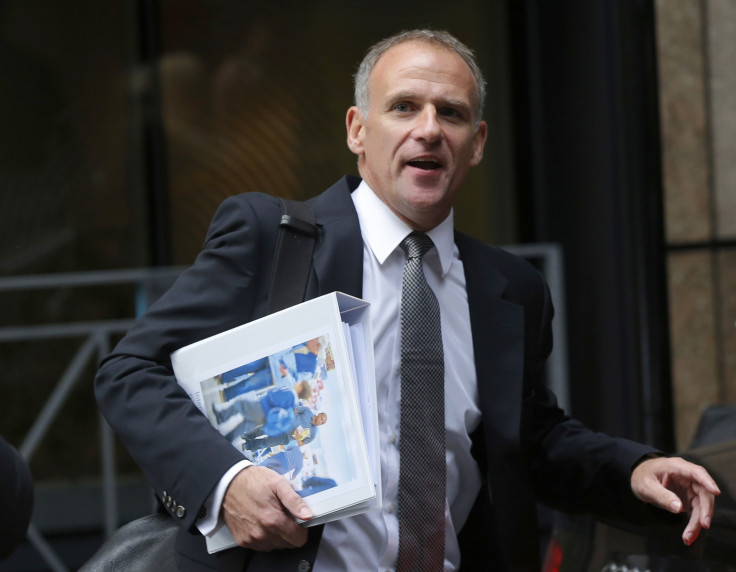Tesco losses: Can 'Drastic Dave' Lewis turn supermarket around?

Tesco reported dramatic losses on Wednesday in a move that stunned the City of London due to their sheer scale.
Despite some predictions of a major financial black hole appearing in the UK media ahead of the announcement, the actual reported pre-tax loss of £6.4bn ($9.6bn, €8.9bn) still surprised analysts.
The 2014 loss marks the company's worst result in its history. It has even made it into the top 10 biggest losses in UK corporate history, entering the inglorious list in sixth position.
It has already been described as a watershed moment, one that marks the end of an era when Tesco racked up mega profits and seemed to be opening a store in every town and village in the UK.
Faced with impressive growth among some of its rivals, notably the German discounters Aldi and Lidl, the UK's supermarket landscape has shifted.
Seeing this coming, the company took action, hiring turnaround guru Dave Lewis last summer with a brief to effectively save the company.
'Drastic Dave' was briefed with spotting the viable parts of Tesco's business, saving and building on them, while the bad bits crash around him.
Short term fixes
Despite the huge loss, Tesco's share price actually jumped when the FTSE opened in London. It since fell and has been volatile in to the afternoon, but the fact that it has not collapsed shows that investors have faith in Lewis's turnaround plan.
Speaking to reporters on Wednesday, Lewis was not overly cheerful but sought to draw a line under the crisis and said there were "encouraging signs" for Tesco.
"We've got a long, long way to go and I don't think it will be smooth as we move through the changes we want to make. We have sought to draw a line under the past and to rebuild from here. Everything we know [about] we have dealt with."
He told reporters that shareholders will not receive a dividend this year and confirmed that 43 underperforming stores had been closed.
The company has also put forward plans to stop the construction of stores at some sites. Lewis previously said in January that the company would terminate the building of 49 planned new stores. (This particular move contributed £925m of today's losses.)
Most of today's shocking figure has come from a revaluation of its property portfolio, which is not as valuable as it used to think it was. This one-off cost comes to £3.8bn.
Up to 7,000 of jobs have gone from closed stores and head office. That number could increase as Lewis searches for a workable model for the supermarket.
Lewis has also focused his efforts on getting more staff into stores and cutting prices, to meet the challenge from rivals, although this play out in the long term.
When asked whether he was shocked by the scale of decline at Tesco, Lewis insisted that he was turning the company around, citing more shoppers visiting the store and rising transactions.
Long term uncertainty
The long term challenges facing Tesco include those facing the industry as a whole, such as changing shopping habits, growing preference for specialist sellers.
But there are plenty of problems that are unique to Tesco that will take longer for Lewis to correct. Its planned and failed expansion overseas, including the US and China, left the company structure geared towards being a global firm but without a global market. However, following those failed ventures, Tesco is a UK-focused company and must fundamentally alter its structure to reflect this.
The rising challenge of discount supermarkets, Aldi and Lidl, has eaten into Tesco's market share. The discounters, which offer a limited range of products at cheaper prices, have been more popular with shoppers in austerity Britain.
There is consensus that Tesco offers too many products and that too much choice had made shopping in Tesco a bewildering experience at times. An often cited statistic earlier this year showed that Tesco had 28 different types of ketchup, while discounter Aldi stocked only one type of ketchup in one size.
Lewis has already acted to reduce the total number of products stocked by the company from 90,000 and it plans to reduce that 90,000 figure by 30%. In theory, less choice makes shopping easier for customers and should allow Tesco to reduce prices across the board. Of course, the move could then present a different issue in that it leaves the stores with empty shelf space. The changes are expected to come in at some point this summer.
While Lewis's reputation for bold action won him the Tesco job, he is facing a sizeable task to turn around the supermarket giant as the mismanagement of his predecessors only becomes clear long after their departure.
Despite his upbeat positivity on Wednesday, major challenges in the food retail market remain, meaning Drastic Dave's turnaround is likely to be volatile for some time.
© Copyright IBTimes 2024. All rights reserved.






